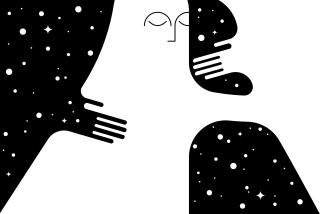DISCOVERIES
- Share via
Psychotherapy Without the Self
A Buddhist Perspective
Mark Epstein
Yale University Press: 262 pp., $25
MARK EPSTEIN was a Buddhist before he became a psychiatrist. Much of his life’s work has been an effort to integrate Buddhism (which embraces egolessness) and Western psychotherapy (which focuses intently on the self, the ego).
It is not so much that Buddhism denies the existence of self, Epstein explains up front, but that we in the West engage in too much hand-wringing over that ephemeral concept. Meditation can help loosen the grip of the self on the soul. Where does therapeutic analysis fit in the process of change?
Buddhism, Epstein writes, “is less about digging and more about opening. . . . In the classical Freudian view, the unconscious is the repository of forbidden urges and instincts, the awareness of which extends and completes the self. In the Buddhist view, the unconscious represents the potential for enlightened consciousness, the latent knowledge that the self that we normally take to be so real has only relative, not absolute, reality.”
Epstein is a clear writer and an insightful guide through the labyrinth. “Psychology Without the Self” has the odd effect of lightness: Burdens long carried seem to drop away as you read.
--
oPtion$
The Secret Life of Steve Jobs
A Parody by Fake Steve Jobs
Da Capo Press: 248 pp., $22.95
DANIEL LYONS (a.k.a. Fake Steve Jobs) enjoyed brief fame last August when he was outed on the front page of the New York Times business section as the blogger behind “The Secret Diary of Steve Jobs.” In “oPtion$: The Secret Life of Steve Jobs,” Lyons, using the same hilarious voice he created for the blog, tells the story of a Fortune 500 chief executive hippie Reed College dropout. Jobs is in trouble. Something about options and criminal charges and SEC inquiry and incarceration.
“You know,” he tells the executives in his company who dare to interrupt his meditation to give him the bad news, “I’m sure this is all very exciting in your weird little world of numbers and laws and big giant textbooks, but I was meditating, do you get it? . . . My job is to make beautiful objects. I cannot do that if I am disrupted by negative people.”
Sheer hubris, seemingly never ending, is what makes this novel such a romp. You know he’s going down, and it just makes you feel, well, happy.
--
Rule Number Two
Lessons I Learned in a Combat Hospital
Heidi Squier Kraft
Little, Brown: 244 pp., $23.99
HEIDI KRAFT is a clinical psychologist who now works as the deputy coordinator for the U.S. Navy Combat Stress Control Program. In February 2004, she was sent to Iraq for seven months with a Marine Corps surgical company. The young die in war -- this, by way of “MASH,” is the first rule. Doctors can’t change rule No. 1 -- that’s the second.
The wife of a Marine, Kraft left her 15-month-old twins when she was deployed to Iraq. At first, she doesn’t understand why her services are required every time a Marine cries. It does not take long, however, for her to understand just how contagious anguish can be.
She holds hands with men in surgery, helps Marines quit smoking, counsels suicidal Marines and colonels torn between concern for their men and the need to appear in control. She worries about her children back home. And she worries about her own increasing emotional numbness in the face of trauma.
Finally, Kraft returns home. A junior psychiatric technician finds her sitting at her desk. “It’s okay,” he tells her, in one of this affecting book’s most affecting moments, “if you’re not okay.”
More to Read
Inside the business of entertainment
The Wide Shot brings you news, analysis and insights on everything from streaming wars to production — and what it all means for the future.
You may occasionally receive promotional content from the Los Angeles Times.










